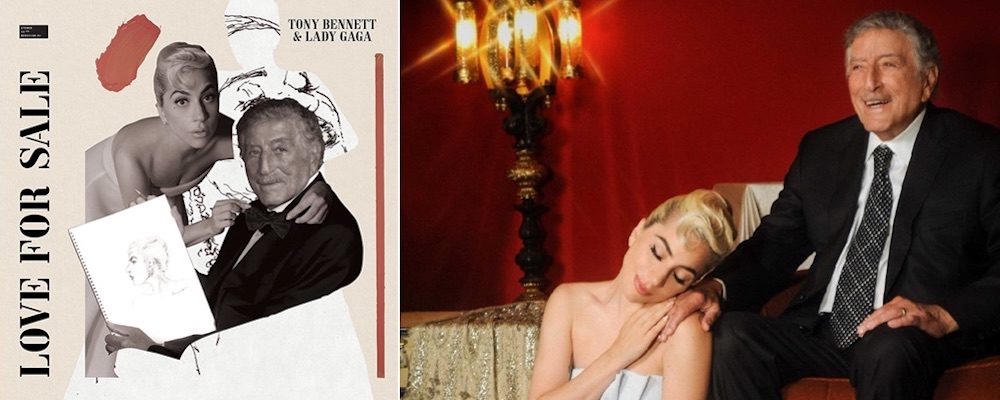On ‘Love For Sale,’ Tony Bennett Reunites With Lady Gaga for a Fond and Fun Farewell
Adi Mehta
When Lady Gaga and Tony Bennett joined forces on 2014’s “Cheek to Cheek,” a few years after Gaga was featured on Bennett’s “Duets II” record, one of the album’s selling points was the oddity of the pairing. But is it really so strange? Even though Gaga pursued an outlandish pop career, some of her first stages were open mic nights at New York City jazz clubs during her teenage years. Being part Italian, and New York born and bred like Bennett, one might expect that her pairing with Bennett’s world of standards and show tunes would be a musical rite of passage for Gaga. The way she delivers standards with era-specific nuance alongside Bennett speaks to the same skill set. Then, there is the general outlandishness of faithfully presented standards in today’s musical context, which is consistent with Gaga’s signature celebration of absurdity in pop. At any rate, the collaboration was a cross-generational success, introducing Gaga to Bennett’s fanbase and Bennett to Gaga’s, and extending sensibilities centrifugally. Now, having announced his retirement after a musical career spanning nearly seven decades, Bennett teams back up with Gaga for his swan song. A concert in August at New York’s Radio City Music Hall, billed “One Last Time: An Evening With Tony Bennett and Lady Gaga,” was the 95 year-old Bennett’s first performance since he revealed his Alzheimers disease diagnosis. His final triumph comes in a new collaborative album, “Love For Sale,” in which the two take on twelve Cole Porter classics.
The music here is swinging jazz of the most wide-grinning, finger-snapping variety. Gaga and Bennett play the Porter tunes practically as they would have been performed when first composed, adding no discernible modernizing touches, no contemporary recording gimmickry, no radical reimagination. Two of the tunes, “I’ve Got You Under My Skin” and “I Get a Kick Out of You,” are best known from Frank Sinatra’s versions. The songs transport you to a dim lit club from the jazz age, with the singers and musicians dutifully recreating classic sounds.
Tony Bennett’s appeal has always been one of cool, unassuming swagger, with an easy sway and a voice that lends itself to the casual romantic musings that constitute the bulk of the songs he sings. On “Love For Sale,” he is up to his usual, easing through every song in his characteristic manner. He can sound, at times, like a caricature of himself. On the opener, “It’s De-lovely,” when he proclaims, “It’s delightful, it’s delicious, It’s delectable,” he validates Alec Baldwin’s SNL impression, featuring a song called, “I Love Things That Are Great.” The only considerable difference in Bennett’s latest singing is that his voice has grown more coarse with age. The change is generally subtle, but more noticeable at certain moments. On the title track, his voice sounds especially rough, which can be seen to add character to the song. On “So In Love,” the audible markings of age fit the lyrics, as Bennett ruminates and reminisces about “the night when you first were there.”
Whereas Bennett thrives on a simple, but fondly familiar singing style, it’s not all too contentious to opine that female jazz vocalists have altogether been more expressive, fluid, and technically impressive. Lady Gaga follows in the tradition of these singers through the ages and, as usual, executes it masterfully. The opening number is not too far removed from Ella Fitzgerald’s version, and the tracks generally find Gaga staying in close reach of such references. Gaga’s commitment to craft shows in the details. She goes so far as to mimic the accents of singers in earlier eras with a precision that few singers attempt. It can function to enhance the camp and humorous qualities of retro stylings. It’s especially apparent when she throws in impromptu calls and when she overdoes it for anachronistic lyrics like “I’m a worthless jack” from “You’re the Top.”
Gaga sounds like she sings a majority of the album smiling, overemphasizing the giddy frivolity of the music. She lingers with vibrato at strategic moments, and swivels between registers artfully. On “Do I Love You,” she dons a hollow, flinty voice that sounds enfeebled by passion. On “I’ve Got You Under My Skin,” she sings like someone who has perhaps had a couple of cocktails and is bleating with extra boldness. There is an emotional potency in the command with which she glides from coy utterances to defiant bellows. On “Let’s Do It,” she switches moods with just her voice tone when she moves from the sustained reflections of the intro to the swinging verse. Her singing on the album is a fully realized performance.
Naturally, some of the most memorable moments on “Love For Sale” occur when Bennett and Gaga trade lines and join in harmony. The sound they produce is part painstakingly crafted nostalgia, part effortless constancy, while the tunes they sing are standards that have stood the test of time. Meanwhile, the personalities behind the voices impart special value, bridging generational gaps, connecting dots from disparate genres, and speaking to the unifying power of music. Tony Bennett gives his legacy a proper celebration just from the consistency with which he dishes out tunes in a style that has accrued cultural resonance over the near seven decades of his career. By joining forces with Lady Gaga, he extends his sphere of influence to younger generations, while Gaga balances the act from the other direction. The renditions of Porter classics that the two deliver are faithfully crafted and realized in a way that effectively takes you back in time, while demonstrating the ability of music to transcend time.
“Love For Sale” releases Oct. 1 on Apple Music.

